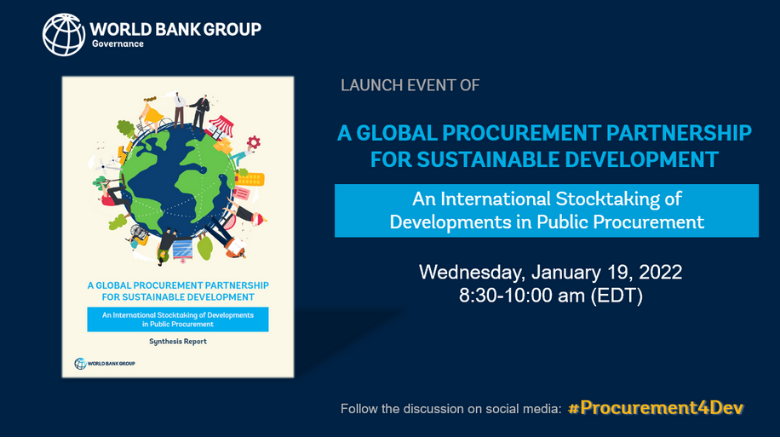A Global Procurement Partnership for Sustainable Development: An International Stocktaking of Developments in Public Procurement
January 19, 2022
Online
MULTIMEDIA

-
Sound public procurement can free up a trillion dollar in savings annually that could be used to sustain green, resilient, and inclusive economies. Governments today spend an estimated $13 trillion on public contracts for goods, services, and public works. At the same time, they lose a quarter of this spending due to inefficiencies. Pressure to improve procurement practices is likely to increase in the coming years as governments grapple with unprecedented levels of debt, decline in tax collection, and increased income inequality.
A new report, Global Procurement Partnership for Sustainable Development – An International Stocktaking of Developments in Public Procurement, shows how the role of public procurement can support broader policy goals such as environmental stewardship, resilient and inclusive economic development, and social protection. The report event launch discussion was focused on how public procurement can play a central role in setting the global economy on a more sustainable path, and how a broad international coalition—involving governments as well as private businesses—could contribute to efficiency and deliver better services to people all over the world.
This report has been prepared by a team of global experts and World Bank consultants, including Joseph Fagan (E-Procurement Specialist, International Consultant), Gustavo Piga (Professor of Economics, University of Rome Tor Vergata), Omar Tiwana (Former Lead Procurement Specialist, Asian Development Bank), and Peter Trepte (Senior Fellow of Public Procurement Law, University Of Nottingham).
-
Time
Agenda
8:30-8:40 am
Welcome and Opening Remarks 8:40-8:43 am Remarks from EC representing the donors of the GPP MDTF 8:43-8:46 am Remarks on GPP Development Effectiveness 8:46-8:48 am
Introduction of the Stocktaking Study Team 8:48-9:00 am
Presentation of the Stocktaking Study and the GPP Vision 9:00-9:03 am Introduction of the Panelists 9:03-9:28 am
Panel Discussion: Re-imagining Public Procurement
9:28-9:30 am Concluding Remarks 9:30-9:50 am
Q&A Time 9:55-10:00 am
Closing Remarks
-